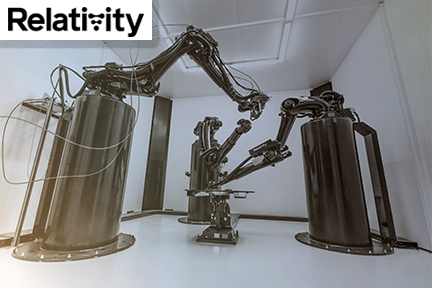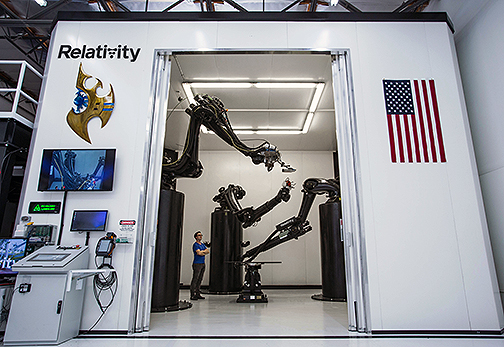
Relativity has appointed three aerospace veterans to the company's executive team and has received an industry-leading, new, patent grant for their autonomous 3D printing technology.
The company has now hired 12 former, senior leaders from SpaceX, Blue Origin, Virgin Orbit, Aerojet Rocketdyne, Waymo, Zoox and Tesla, and has also secured a key patent for 3D printing metal using machine learning.

Tim Buzza.
Tim Buzza, recognized as one of the world’s foremost experts in rocket development, as well as among the first leaders and a 12 year at SpaceX, as well as the former Co-President and Vice President of Launch at Virgin Orbit, officially joins Relativity as Distinguished Engineer after serving as an Advisor to the company.

Joshua Brost.
Josh Brost, a nine year veteran at SpaceX responsible for securing $3 billion in contracts with the U.S. Government and commercial entities, joins as VP, Government Business Development.

David Giger.
David Giger, a 13 year SpaceX veteran who directed engineering, program, and leadership responsibilities for more than 200 engineers in the design, testing and build of the multi-billion dollar Cargo Dragon and Crew Dragon spacecraft programs, joins as VP, Launch Vehicle Development for Relativity’s Terran 1 rocket.
Relativity was recently granted US Patent Number US20180341248A1, Real-time adaptive control of additive manufacturing processes using machine learning, for the company's groundbreaking 3D metal printing technology using advanced sensors and control software. Disrupting 50 years of aerospace technology, Relativity is the first and only aerospace factory to use a proprietary and patented autonomous 3D printing technology, machine learning and software to optimize every aspect of the rocket manufacturing process.

Relativity's Stargate, the largest metal 3D printer in the world — Built for rockets. Photo is courtesy of the company.
Relativity can print their next-generation Terran 1 rocket in less than 60 days, while traditional rockets require 18 months or more to complete. Terran 1 is the world’s first completely 3D printed rocket, with 100x fewer parts than traditional rockets, vastly better manufacturing reliability, rapid build time, and faster time to launch.
Relativity is on track to conduct their first full orbital launch by the end of 2020 and continues to grow a global customer manifest of commercial and government payloads. The company recently became the first venture-backed company to secure a launch site Right of Entry at Cape Canaveral from the U.S. Air Force, adding to the firm's portfolio of major government partnerships, including a 20 year, exclusive-use, CSLA agreement at the NASA Stennis Space Center E4 test complex as well as a NASA ACO test award.
The company is expanding its infrastructure this year with a fourfold expansion to more than 240,000 square feet of operations, production, testing, and launch facilities. Relativity’s team has grown almost 5x since March, from 14 to 64 full time employees in under a year.
Executive Comments
Tim Ellis, the CEO of Relativity, said the company's progress toward launching the first 3D printed rocket is fueled by a deeply experienced team that has built and scaled other space companies — Tim, Josh, and David are renowned leaders in their fields. These executive appointments, combined with the company's recent patent grant, are great indicators of Relativity’s market momentum.
Jordan Noone, the CTO of Relativity, added that the grant of this patent is a recognition of how the company's autonomous 3D metal printing technology can quickly and iteratively optimize rocket production on Earth and other planets and is a pivotal step toward our technology differentiation and leadership in the market.

